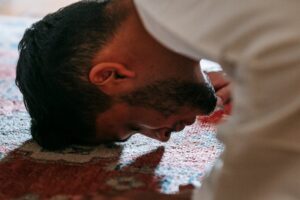If we ask many Muslims about the purpose of our existence, many will answer and quote from the holy Quran: {And [know that] I have not created [either] jinn or human beings [for any other end] but to [know and] worship Me [alone]. 51:56}. The idea of living for such a great purpose gives each person a meaning for his or her existence, that you live to serve and submit to the One you owe for all the blessings and provisions you enjoy in life. But if we know that Allah (SW) is the Self-Sufficient (Al-Ghaniyy) who is in no need of anyone, some might ask: Why worship Him then?
As a matter of fact, it is a declared creed in our faith that God will not benefit from our worship nor be affected from our sins. The answer to the question above was mentioned in another verse in the holy Quran: {O humankind! Worship your Lord, who created you and those before you, so that you may become God-conscious. 2:21}. Being God-conscious or God-fearing, Taqwa in Arabic, was a term used in the Quran numerous times.
Taqwa is the journey in life preventing harm and inviting wellness, and we as humans are the ones who reap the benefit of our acts of worship, not God.
Take a look at the five main pillars of Islam and their relativity to Taqwa as a benefit to humans:
The main idea behind the Kalimah of Tawheed or Al- Shahadah is to declare that God is One, to be worshiped alone. But it also means that if there is only One Mighty Entity [God] to be praised and worshiped, then no man is better than another, all are equal under the Supreme God. This simple, yet deep and major concept was demonstrated by the Sahabi Rib’iy Ibn Amer who told the general of the Persian army: “We are people Allah has chosen to guide people to stop worshiping other people, and to worship the One God.” In other words, if no one is holy but God, then all humans are equal regardless of their wealth or race or lineage.
The five daily prayers we perform are our supplication to God and the zone of comfort we seek to bring peace and tranquility to ourselves while being in an act of worship submitting to God. But at the same time, if it is not followed by inviting ethical and moral practices into one’s life, then have we really prayed? Allah (SW) says: {Indeed, the Prayer guards [one] against immorality and evil. 29:45}.
Giving charity in the form of Zakat or Sadaqah is described as creating a status of purity in each person’s life. Allah (SW) said: {Take from their wealth a charitable offering to cleanse them and purify them hereby. 9:103}. This should be seen as a source of humility and humbleness to remember the poor and needy while being grateful to God for the wealth He (SW) brought to you rather than being arrogant and feeling superior over others.
Fasting the month of Ramadan as an act of worship by temporarily abstaining from permissible things like food and water in an act of sacrifice to God should reflect the ability to abstain from any act of harm toward others. The prophet (SAAW) said: “One who does not abstain from false statements and acting on it, God is in no need for him to abstain from food and water.”
Pilgrimage is the ‘once in a lifetime’ act of worship that includes many rituals, but it is summarized by the beautiful words spoken by the prophet (SAAW) on the Day of Arafah as to how it should reflect on people. “All mankind is from Adam and Eve, an Arab has no superiority over a non-Arab, nor has a non-Arab any superiority over an Arab; also, a white has no superiority over a black, nor has a black any superiority over a white- except by piety and good actions. Learn that every Muslim is a brother to every Muslim, and that the Muslims constitute one brotherhood. Nothing shall be legitimate to a Muslim, which belongs to a fellow Muslim unless it was given freely and willingly. Do not therefore, do injustice to yourselves.”
There are clear and direct verses and Hadiths referring each act of worship to the idea of Taqwa. And in this holy Hadith, Allah (SW) speaks clearly about the idea of worship leading to Taqwa and how it is understood:
“O My servants, you will not attain harming Me so as to harm Me, and will not attain benefitting Me so as to benefit Me. O My servants, were the first of you and the last of you, the human of you and the jinn of you to be as pious as the most pious heart of any one man of you, that would not increase My kingdom in anything. O My servants, were the first of you and the last of you, the human of you and the jinn of you to be as wicked as the most wicked heart of any one man of you, that would not decrease My kingdom in anything. O My servants, were the first of you and the last of you, the human of you and the jinn of you to rise up in one place and make a request of Me, and were I to give everyone what he requested, that would not decrease what I have, any more that a needle decreases the sea if put into it. O My servants, it is but your deeds that I reckon up for you and then recompense you for, so let him who finds good, praise Allah, and let him who finds other than that, blame no one but himself.”
During this blessed month of Ramadan, this blessed month of fasting, this blessed month of Quran, I pray that Allah will accept our humble and sincere worship, and forgive our weaknesses, and strengthen us in Taqwa. Ameen.
By Sh Kifah Mustapha




